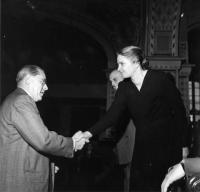Later on, Mme Laure was passing Buchman's room at Caux when Campbell emerged saying that Buchman was refusing to take his medicine. Mme Laure, a nurse by profession, took the bottle and marched in. 'Do you think you could be reasonable for once in your life and take your medicine?' she demanded. Buchman took it.
Irene Laure often tells how Buchman sent her son, Louis, and a French friend to develop his work in Brazil. It was at an MRA assembly in 1952, during which Laure and his friend devoted more time to the city and the beach than to the sessions. Buchman sent for them.
'God has told me to put into your hands the changing of Brazil - a country several times the size of France,' he announced as they came in. They were flabbergasted and asked whatever they would do down there. 'It's quite simple,' he said. 'When you get there, you plant a post in the ground at the airport and then another some way away from it. Then you tie a rope between the posts and suspend yourselves from the rope. Go whichever way the Holy Spirit blows you.' They left his room little the wiser - but he had caught their imaginations.

They went to Brazil, and some of the first people they contacted were the dockers of Santos, who led them on to the dockers of Rio de Janeiro. Such changes took place in the port of Rio that the film Men of Brazil wasmade about it and shown all over the world. The dockers took Buchman's work throughout Brazil and to many other South American countries.
Buchman's personal relationships with women were as varied as the women themselves. He treated Eleanor Forde, the first woman to travel with the Oxford Group, as a close and trusted companion. Women often led meetings at house-parties in the thirties, and many of the larger initiatives came through them. 'What shall we do next?' Buchman asked a roomful of colleagues at the end of the 1931 Oxford house-party. Out of the silence, Eleanor Forde piped up from the back row, 'I think we should go to Canada.' 'That's it,' said Buchman. 'You go and get it ready.' She did, the campaign starting just a year later. Similarly, Mrs Alexander Whyte, nearly three times Eleanor Forde's age, first led him to Geneva. Dozens of other instances could be given, both before his stroke and afterwards.
'Frank responded to the spark in people, regardless of gender,' writes Signe Strong, the Norwegian artist who was with him as a young woman during the war. 'He respected the courage and trust displayed by the women, whether lettered or unlettered, who came out in public, opened their homes, introduced us to their friends, risked their reputations.5 One of those he loved and respected most was Annie Jaeger, the tiny shopkeeper from Stockport. When she spoke at a meeting of Oxford students in the thirties and some looked bored, he said, 'You listen - she has more of Christ in her little finger than most of you have in your whole bodies.'
471
Photo: At Caux: Dr. Heinrich Str?ter (Germany), greets Madame Ir?ne Laure (France).
©Arthur Strong/MRA Productions